Community Participation and Inclusion during a Pandemic: Recent Experiences from Around the World
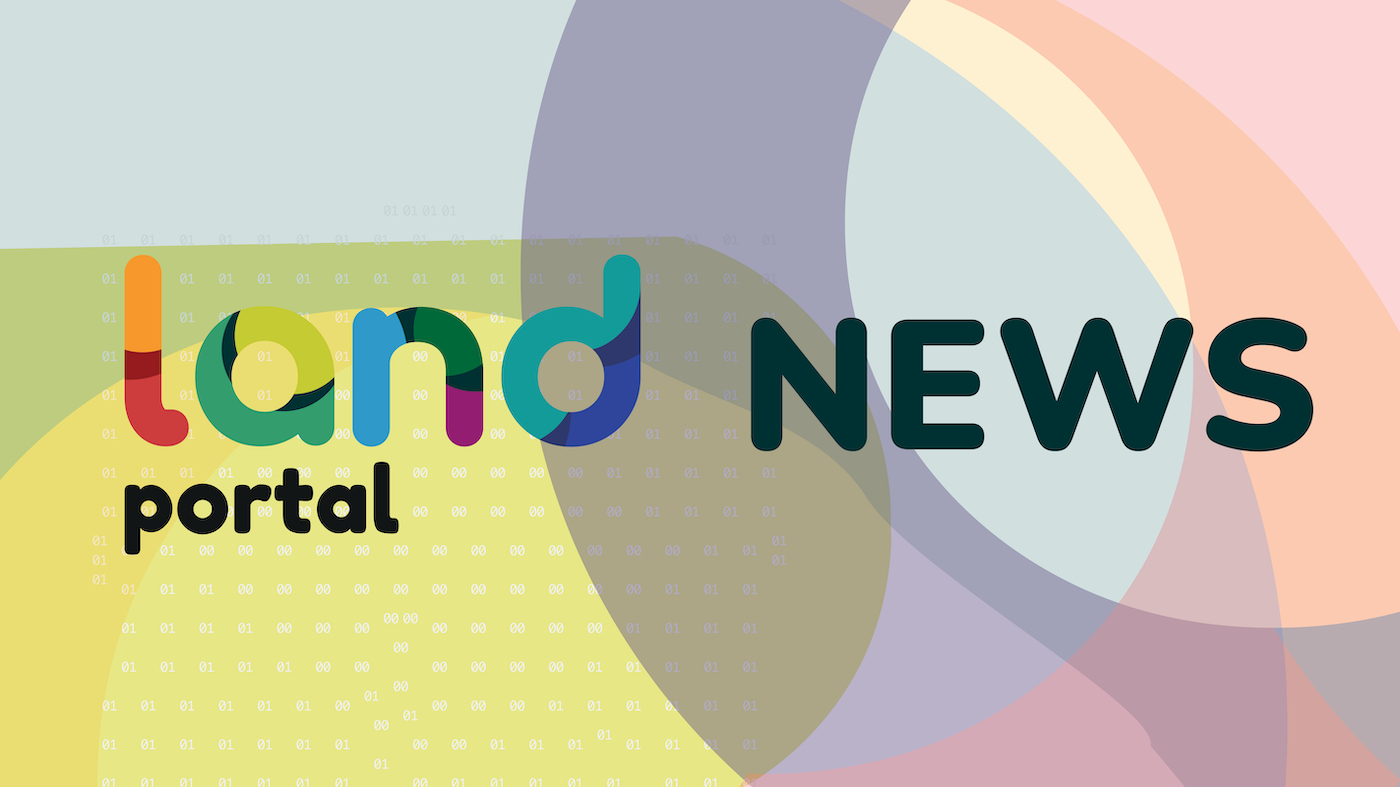

How can we reconcile the hazards of social interaction in a COVID-19 world with the importance of community participation to the successful, and sustainable, implementation of on-going land projects?
The COVID-19 pandemic has disrupted all aspects of life and ways of working. From large cities to remote communities, no one has been left untouched from the impact of the pandemic. With strict health standards in place, COVID-19 has significantly impeded the way land tenure projects are operating in the field. Many of the participatory aspects of land tenure projects have had to be either postponed or adjusted in order to reduce the risk of transmitting the virus. This has the potential to obstruct successful and sustainable implementation for projects seeking to formalize and secure land tenure, where community participation is of the upmost importance. Many are left asking the question: how can projects meaningfully engage and include communities during a pandemic?
Global Land Alliance (GLA) is facing this very question while supporting the implementation of a Bilateral donor-financed land tenure formalization project in Colombia. As part of this work and conceptualization, GLA’s Community Participation and Inclusion Desk interviewed field officers and team leaders representing different projects from around the world. We discussed their experiences, adjustments in their field activities during this crisis, as well as our own thoughts for continuing to engage community stakeholders while actively taking precautions during the pandemic.
The common COVID-19 strategy among the five projects and the international organizations interviewed is the application of basic safety measures in their participatory activities; including but not limited to: mandatory masks, hand washing, physical distancing. To respect physical distance recommendations, many organizations are conducting a larger quantity of community meetings with fewer participants and only in outdoor or open spaces. It is important to mention that the measures taken in these projects have not been evaluated and are presented as illustrative examples.
Examples of Community Engagement during COVID19
MOZAMBIQUE
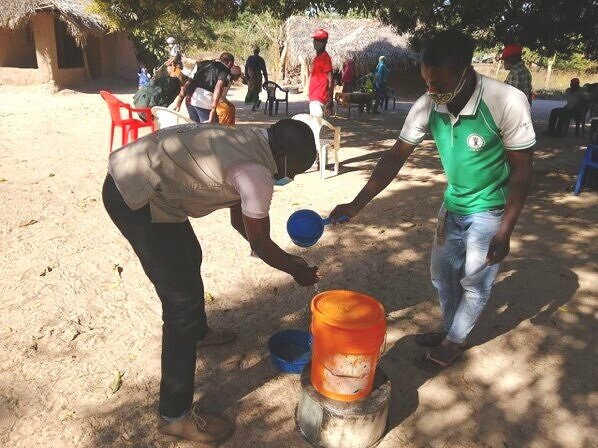
Photo courtesy of ORAM and the CaVeTeCo Project
The Project “CaVeTeCo”, Community Land Value Chain, implemented by ORAM Nampula with assistance from Terra Firma, Nitidae, and LUPA, provides an independent platform of integrated instruments and technology that document and register land rights. Despite COVID-19, CaVeTeCo was able to conduct participatory activities with the community, creating a community map illustrating land and resource use. The project included COVID-19 prevention messaging at the beginning of every meeting and mitigated risk by holding a larger number of meetings with fewer participants. As opposed to bringing outside technical specialists into the community to collect information, the project successfully trained local youth to document land rights and organize the necessary information for land registration. Additionally, the project has held a greater number of meetings, with fewer participants in each specific areas. This approach has allowed implementers to more efficiently plan visits for the parcel surveys as it is easier to coordinate the participation of fewer people per meeting.
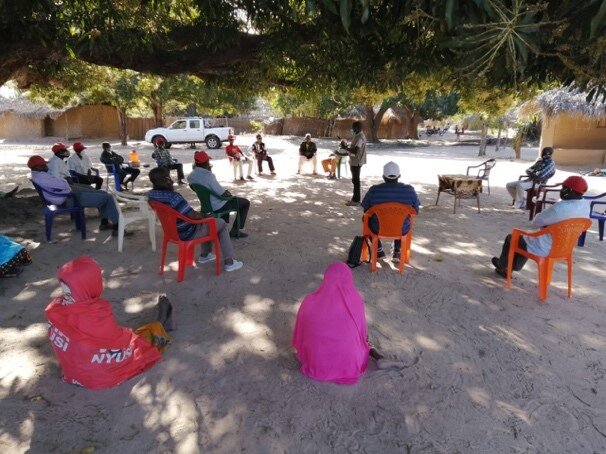
Photo courtesy of ORAM and the CaVeTeCo Project
One of the challenges the project reported facing is the improper application of masks by community participants. The project continues to promote the correct use of face masks, but some participants still do not completely cover their nose or mouths which reduces effectiveness and safety of the mask and the usefulness of the protocol.
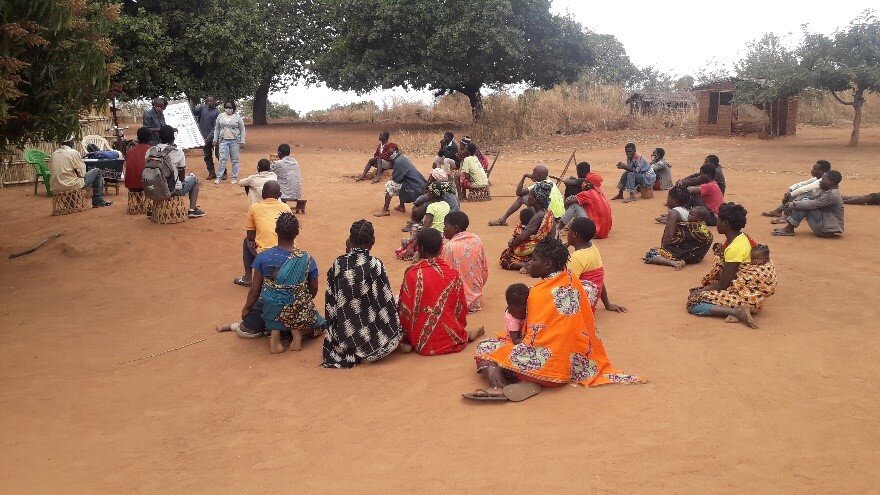
Discussion-limited meeting, photo courtesy of Verde Azul Consult
MOZAMBIQUE
In another example from Mozambique, the LANDSCAPE program aims to improve living conditions through the sustainable use of forests and other natural resources. Verde Azul Consult reported that LANDSCAPE’s activities include: 1) Promoting integrated landscape management; 2) Strengthening the enabling conditions for sustainable forest management; 3) Supporting the integration of smallholder farmers and small emerging commercial farmers in key agriculture and forest-based value chains through training and technical assistance, and access to finance to these and other key rural small and medium enterprises.
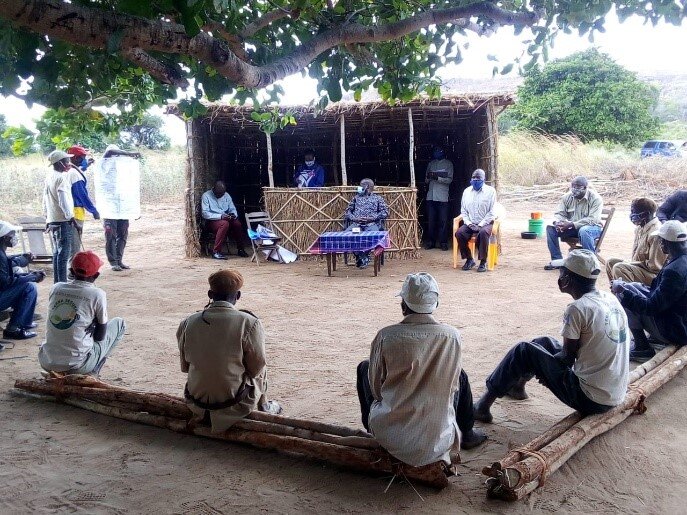
Community Leaders Meet, Photo courtesy of Verde Azul Consult
The program fieldwork work entails significant interaction with community members in the form of community meetings, parcel delimitation activities and exposition of results. In addition to the basic safety measures, the program has reduced the quantity of participants per meeting and increased the overall number of meetings. This has added time and resources required for the implementation of the fieldwork, nevertheless, it has allowed LANDSCAPE to continue deploying their trainings and services.

Photo courtesy of Verde Azul Consult
MERIDIA
Meridia is a social venture that offers services for land documentation, mapping, titling, and tree registration. The projects involve significant fieldwork including community meetings, sensitization campaigns, interviews and parcel mapping with communities. They navigated the different country lockdowns by working with local governments, local stakeholders and their clients (large agricultural commodity buyers) to assess the level of risk, understand the local regulations, delineate the protective measures to be taken and adapt the project logistics to the new measures. They continue to closely monitor the COVID-19 situation at a local level prior to entering a new project area.
The Meridia technical field teams, which, in some countries, are made up of local people who were trained to collect the data, have continued to do sensitization campaigns and registration services in project areas, while following COVID-19 safety measures such as masks, social distancing, providing hand disinfection and reducing the number of people per meeting. They have noted that ensuring women’s participation and inclusion has been challenging, given the reduction in meeting size from 50 people to 5 people per meeting. Nevertheless, the field teams continue to impress the importance of women participating and of including wives or partners’ names in the land documentation.
ETHIOPIA
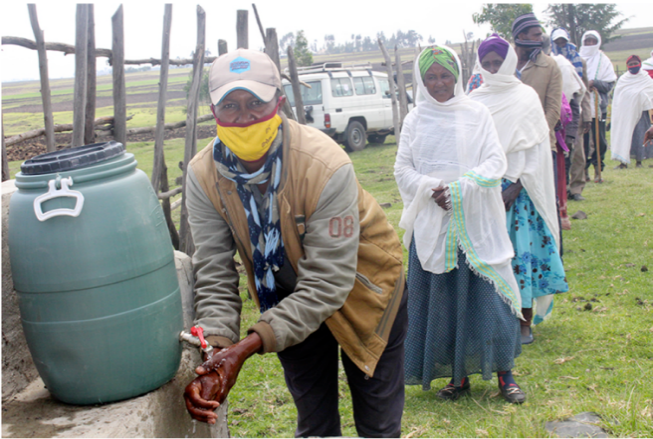
Photo courtesy of DAI and Project LIFT
Land Investment for Transformation, or Project “LIFT”, implemented by DAI, guarantees land rights to small farmers in Ethiopia by documenting land rights, improving land governance and providing access to financial services and agricultural inputs. At the time of our interview, LIFT was reaching the later stages of their participatory methodology, including the public exposition of field results (which will be displayed in a publicly available open-air space) for approval by the community and the distribution of land certificates.
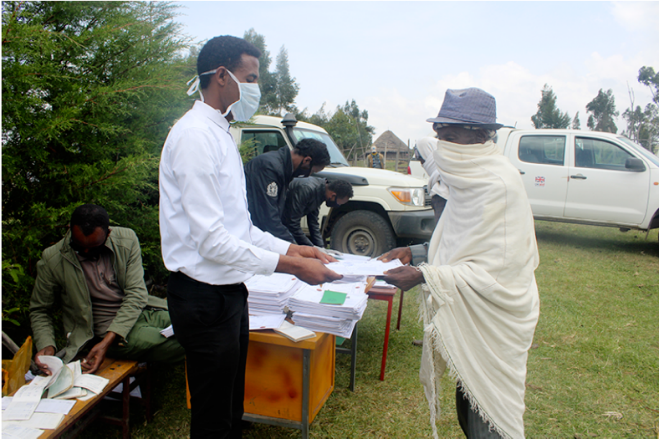
Photo courtesy of DAI and Project LIFT
Given the risks of COVID-19, the project has included the participation of health extension personnel during these field activities to educate the public and seek to reduce the risks of transmission of the virus. The directors of the project are closely monitoring the state of the pandemic in the regions in which they are operating, evaluating the short and long-term effects of COVID-19 on the operational process, the effects of COVID-19 on land tenure in Ethiopia, and what impact COVID-19 will have on the expected results of LIFT.
DOMINICAN REPUBLIC
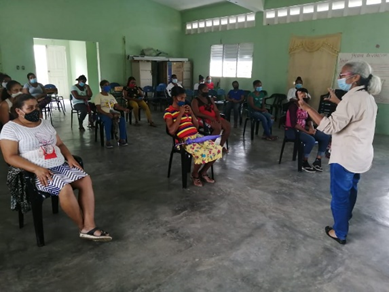
Photo courtesy of REDDOM
Fundación REDDOM is a Dominican nonprofit organization that promotes, designs, and implements many development initiatives, including rural economic development and food security. As part of a government agroforestry project, REDDOM is implementing a study on the unintended social risks of land titling in impoverished rural regions in coordination with government efforts to verify and measure rural landholdings. In the face of COVID-19 internal travel restrictions, they have utilized a ‘local-approach’ to train youth in the community to conduct individual, home-based surveys using tablets and online questionnaires and to use GPS equipment to measure landholdings. This information is then transmitted back to the the capital for analysis and processing.
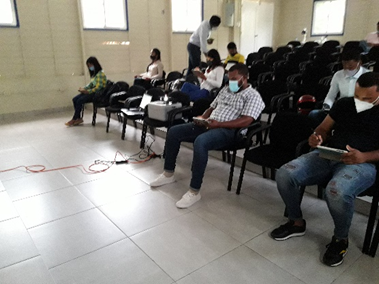
Photo courtesy of REDDOM
This ‘local approach’ reduces the risk of COVID-19 transmission in the community. The approach also facilitates trust between the project and community, as many communities and individuals have expressed fear of outsiders. The approach also offers local youth the opportunity to learn a technical skill and to generate income. The use of the electronic questionnaire reduces the possibility of contamination from multiple individuals handling and exchanging documents, as the electronic devices can be cleaned frequently. In general, implementation of the ‘local approach’ has increased the program’s operational expenditures by around 25% for the fieldwork with an additional 10% increase for training community youth; but the new focus and related costs have allowed the work to continue as opposed to coming to a full-stop.
ECUADOR
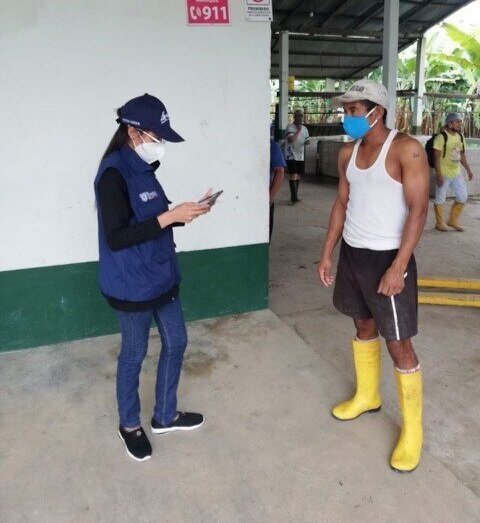
Photo courtesy of Project Social Safety Net
The Ecuadorian project, "Social Safety Net”, implemented by the Government of Ecuador, began in December 2019 and has developed a participatory census sweep process for updating the Social Register. Despite the pandemic and the modifications made to the census sweep process, Social Safety Net continues to receive information from the field through in-person household visits. From the beginning of the pandemic, the training of survey personnel switched to completely virtual, with videoconferences and local-based live sessions (supervised and accompanied). In the early phases of adapting to the constraints of COVID-19, the project initially intended to do the household interviews via phone but after brief trials found that it took more time and compromised the quality of the data.
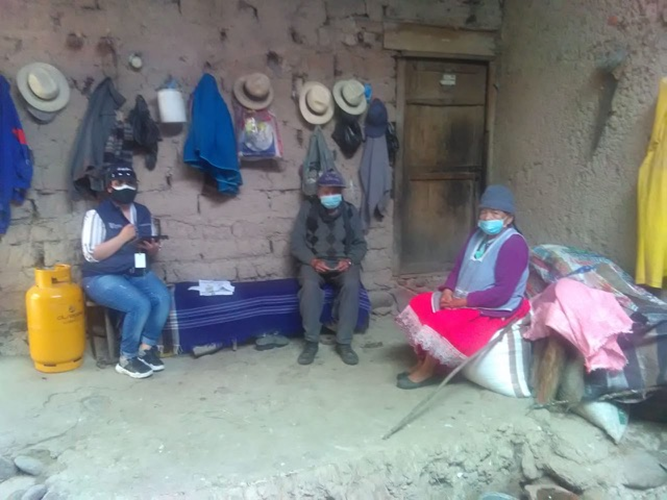
Photo courtesy of Project Social Safety Net
The decision was made to return to the field, but with modifications, including: (1) reducing the number of questions and, as a result, the duration of interviews and (2) documenting responses through tablets to reduce the use of paper and the possible transmission of the virus. Unsurprisingly, some communities have declined to participate in the survey. Communities that declined to participate typically had limited cases of COVID-19 and also are traditionally wary of government. Social Safety Net has resumed in-person activities in the majority of the geographic regions of the country, with the exception of the Amazon, due to the particular vulnerabilities of the region’s inhabitants. As the work progresses, the project intends to increase social messaging about the program to combat the spreading of misinformation – especially as related to the risks of COVID-19 – and to begin regular training sessions for field personnel to ensure good practices are being maintained in the field and update personnel on COVID-19 protocols as they evolve.
CADASTA
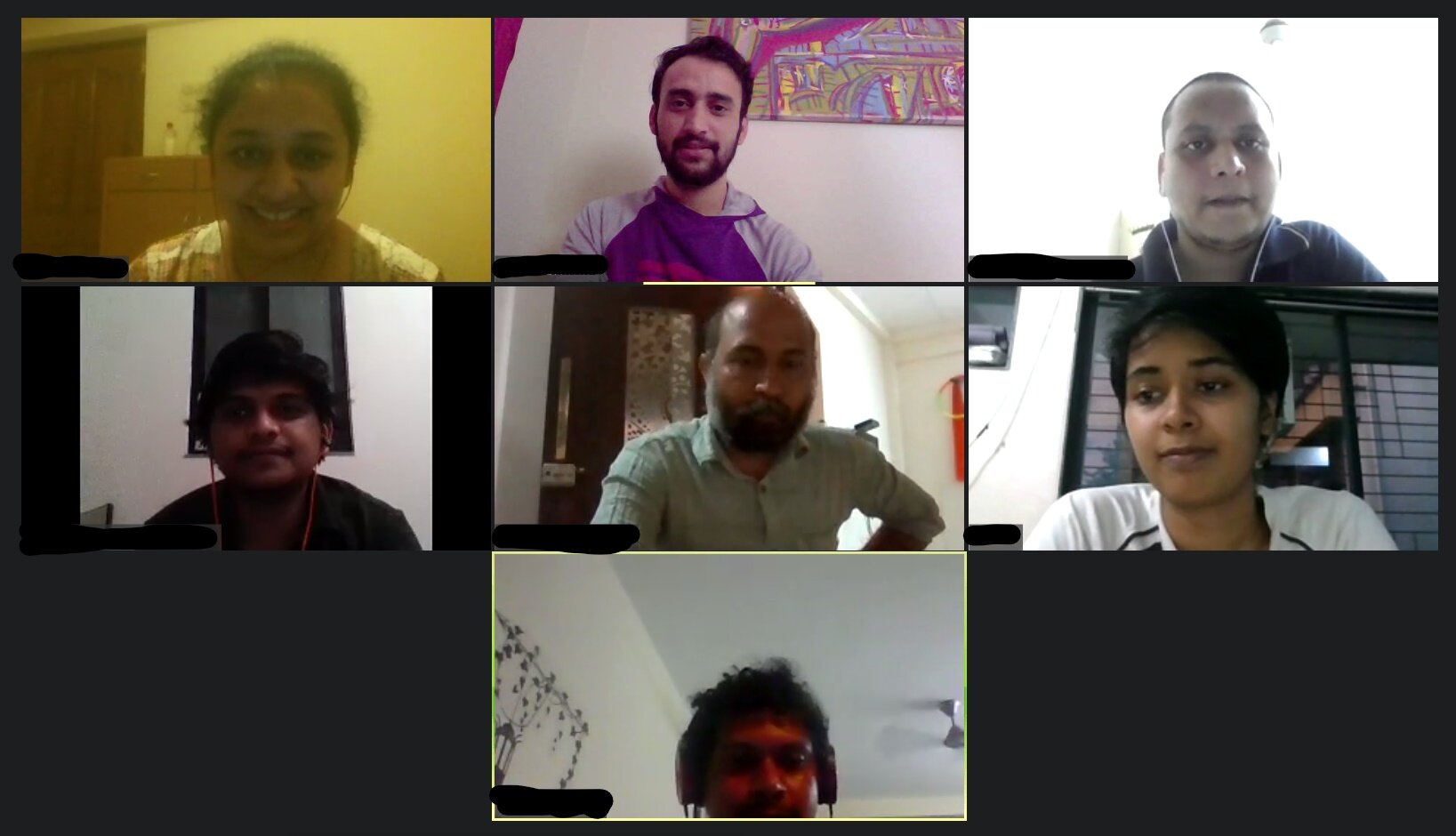
Photo courtesy of Cadasta
Cadasta is a nonprofit organization that provides tools and technical services for the documentation of land and resource rights in over 30 countries. At the beginning of the pandemic, Cadasta created a survey for all local implementing partners to evaluate the status of their projects given the local COVID-19 situation. This survey helped Cadasta adjust the timelines of their projects and the expectations with partner communities, and in some cases revise project approaches to ensure that data collection would be relevant in the context of COVID-19 response.
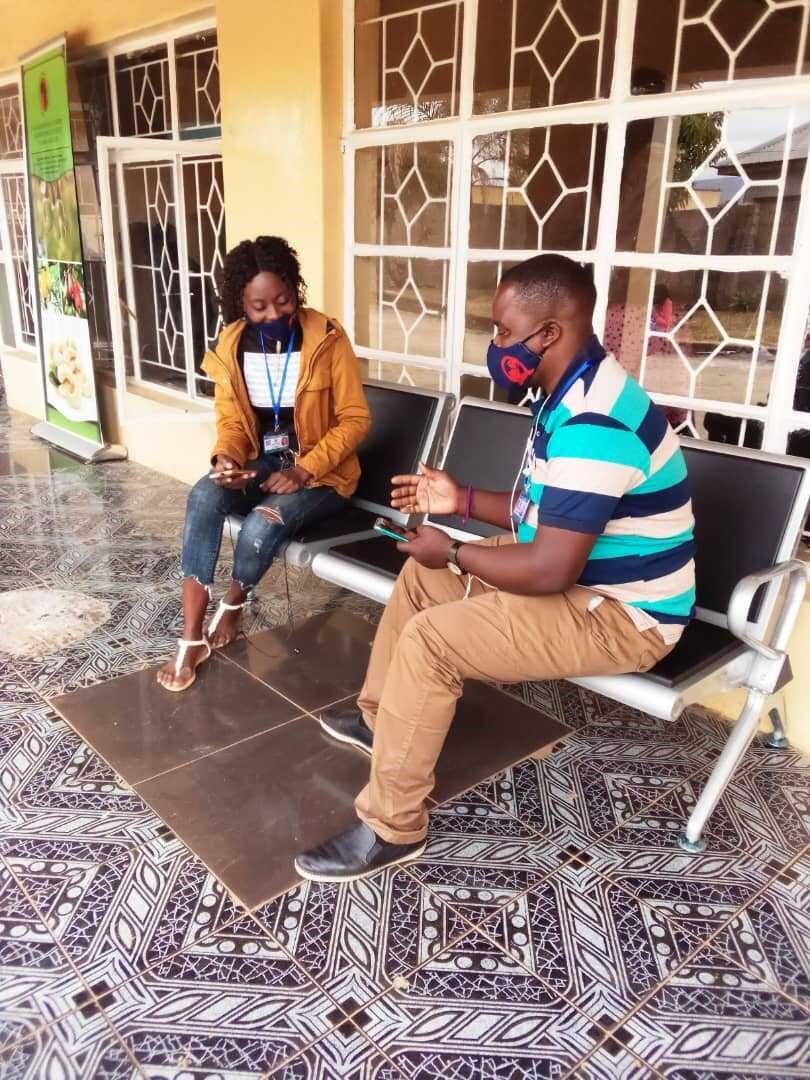
Photo courtesy of Cadasta
During COVID-19, the methodology of survey data collection by Cadasta partners largely shifted to phone calls and remote mapping using imagery, rather than in-person data collection. However, given the need for field verifications of rights and boundaries field visits are inevitable, and while some countries contained COVID-19 to a degree and only briefly paused field activities, in most cases, partner staff are only recently beginning to return to field work under specific COVID-19 protocols as local restrictions are lifted. In the midst of supporting partners with COVID-19 response using the spatial data inherent in Cadasta tools, Cadasta concurrently re-tooled and expanded their virtual training platform and on-line materials, in an effort to prioritize remote training given the uncertainty of a return to normalcy. Trainings are now held via video conference, with partners congregated in large spaces where field personnel can be socially distant and utilize proper sanitary equipment, and the new Cadasta online “Training and Support Center” ensures partner staff have access to all training content and a place to turn for remote support.
COLOMBIA
GLA has developed a detailed set of recommendations for participatory activities that are tailored to the context of land tenure formalization in Colombia. The set recommendations for community participation and inclusion in systematic land tenure formalization campaigns is based on standards issued by: the World Health Organization (WHO); the Pan American Health Organization (PAHO); the United States Centers for Disease Control and Prevention (CDC); the Ministry of Health and Social Protection (MSPS) of Colombia.
GLA developed four overarching principles to guide the implementation:
-
Responsibility: Priority is given to the health and safety of the people in the community and project staff against COVID-19 contraction and spread. No participatory activity is worth bringing a fatal disease to people in the community. The burden of ensuring health safety lies with the project and not on the community. For this reason, projects should strive to provide all the required protective equipment to the personnel and to the participants (when the activity requires it) and inform participants of the risks of participation and of the health security measures that will be taken to prevent the spread of COVID-19.
-
Zero complacency: Precautionary measures have significant weight and importance. Operational processes and plans need to accommodate the COVID-19 reality in the community and national and local public health requirements. Project staff have to set the example of zero complacency by adhering to the safety protocols at all times.
-
Constant monitoring and adaptability: Project implementers need to both stay continually informed and adaptive. Monitoring regional infection curves and regular testing of field personnel is crucial. Furthermore, as scientific understanding of COVID-19 continues to grow, international best practices are changing, therefore constant monitoring, review and modification of operational processes strategies is needed.
-
Risk reduction at each moment of community participation: Whenever possible, project implementers should strive to:
a) Interact virtually (phone, video conferencing, WhatsApp, SMS)
b) Avoid travel (especially between rural and urban areas or from/to areas with a high incidence of COVID-19)
c) Reduce the number of people present in any congregation at the same time
d) Gather in open spaces outdoors or in open air facilities with ventilation
e) Reduce the use and handling of physical materials
Recommendations were tailored for each moment where project staff would interact with the community. Each moment has its own set of applicable recommendations from entry-exit signaling to managing contaminated masks. The protocols include options for reducing the number of people present at one time while still maintaining a flow of small groups of people during the social mapping, public consultation and title issuance steps of the process. For example, the use of hotlines and social media apps can be used to identify and invite smaller groups of neighbors at specific dates and times. It is recommended that these limited gatherings could use several open “activity tents” so that small groups of people can flow participating in the different activities (including: learning about the project, participating in social cartography and filling out forms in small groups of neighbors).
FINAL THOUGHTS
Given the extreme risks of COVID-19, project implementers now face an unprecedented landscape. At the same time, the need and value of community participation remains as important as– or more than – it ever was. Project implementers and field teams around the world are still learning on-the-fly as new information about the virus becomes available and as national and local conditions and restrictions are put in-place and subsequently and repeatedly modified in the face of this ’novel’ challenge.
Key findings of the canvassing and GLA analysis are (not in priority order):
-
pre-COVID-19 technical processes and operational plans will need to be modified;
-
impacts on community, government and donor expectations and corresponding budgets will need to adjust;
-
follow national and local public health protocols;
-
embed public health messages into the program sensitization messaging, but avoid turning a land project into a public health project;
-
open communication with local government and community organizations is essential – organizational and project reputation and, more importantly, lives are at risk;
-
maximize the ‘local approach’ – identify and train responsible local organizations and individuals – especially youth – to interact with the community and collect data;
-
maximize the use of technology and look for ways to leverage project needs as a means to embed technology capabilities into the local communities; and
-
evaluate project timelines to be ‘smart and safe’ not ‘sorry and culpable’.
The common experiences and creative adaptations presented here provide a canvas of the current challenging landscape we all face. Albeit a challenge, the situation also represents an opportunity to collaborate within the land sector, and also across other sectors (particularly public health and social services) and continue to innovate to promote the important task of securing land rights. Global Land Alliance is committed to our mission to support prosperity of people and places though exchange of knowledge and ideas to promote land tenure security. There are many additional approaches to ensuring community participation within the current challenge of COVID-19. GLA welcomes collaboration on this topic to discuss and illustrate your approach!
Source
Language of the news reported
Copyright © Source (mentioned above). All rights reserved. The Land Portal distributes materials without the copyright owner’s permission based on the “fair use” doctrine of copyright, meaning that we post news articles for non-commercial, informative purposes. If you are the owner of the article or report and would like it to be removed, please contact us at hello@landportal.info and we will remove the posting immediately.
Various news items related to land governance are posted on the Land Portal every day by the Land Portal users, from various sources, such as news organizations and other institutions and individuals, representing a diversity of positions on every topic. The copyright lies with the source of the article; the Land Portal Foundation does not have the legal right to edit or correct the article, nor does the Foundation endorse its content. To make corrections or ask for permission to republish or other authorized use of this material, please contact the copyright holder.
